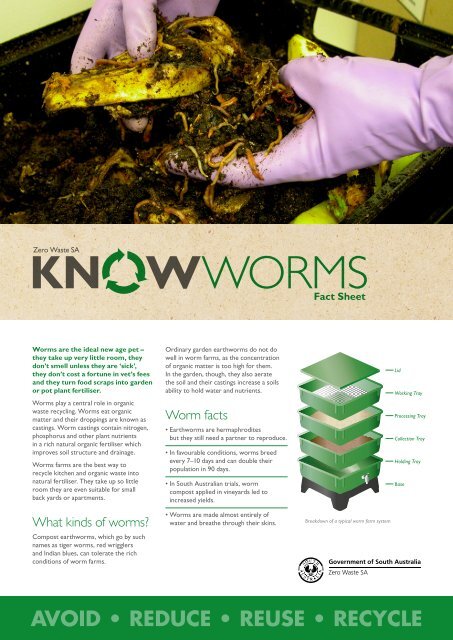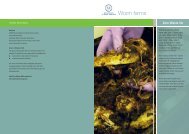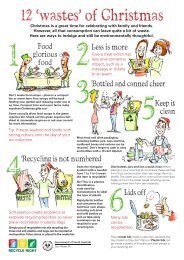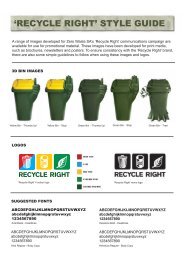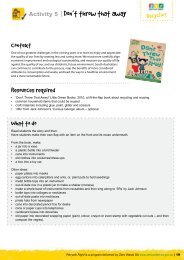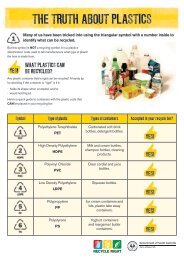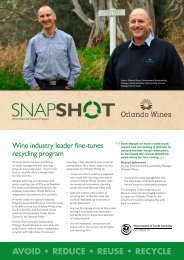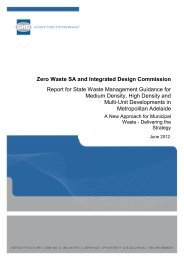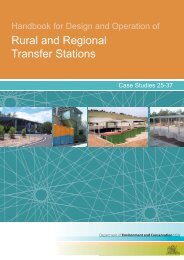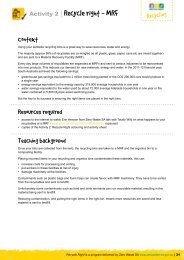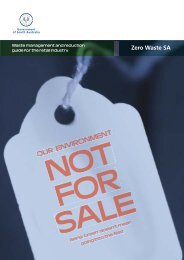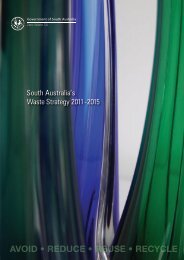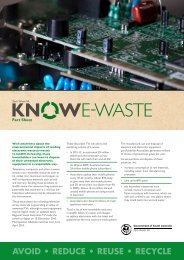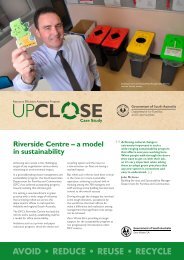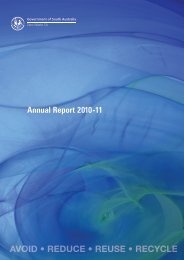fact sheet about worm farms. - Zero Waste SA - SA.Gov.au
fact sheet about worm farms. - Zero Waste SA - SA.Gov.au
fact sheet about worm farms. - Zero Waste SA - SA.Gov.au
You also want an ePaper? Increase the reach of your titles
YUMPU automatically turns print PDFs into web optimized ePapers that Google loves.
A <br />
www.zerowaste.sa.gov.<strong>au</strong> or call 08 8204 2051<br />
<strong>Zero</strong> <strong>Waste</strong> <strong>SA</strong><br />
KN WWORMS<br />
Fact Sheet<br />
Worms are the ideal new age pet –<br />
they take up very little room, they<br />
don’t smell unless they are ‘sick’,<br />
they don’t cost a fortune in vet’s fees<br />
and they turn food scraps into garden<br />
or pot plant fertiliser.<br />
Worms play a central role in organic<br />
waste recycling. Worms eat organic<br />
matter and their droppings are known as<br />
castings. Worm castings contain nitrogen,<br />
phosphorus and other plant nutrients<br />
in a rich natural organic fertiliser which<br />
improves soil structure and drainage.<br />
Worms <strong>farms</strong> are the best way to<br />
recycle kitchen and organic waste into<br />
natural fertiliser. They take up so little<br />
room they are even suitable for small<br />
back yards or apartments.<br />
Ordinary garden earth<strong>worm</strong>s do not do<br />
well in <strong>worm</strong> <strong>farms</strong>, as the concentration<br />
of organic matter is too high for them.<br />
In the garden, though, they also aerate<br />
the soil and their castings increase a soils<br />
ability to hold water and nutrients.<br />
Worm <strong>fact</strong>s<br />
<br />
but they still need a partner to reproduce.<br />
<br />
every 7–10 days and can double their<br />
population in 90 days.<br />
<br />
compost applied in vineyards led to<br />
increased yields.<br />
Lid<br />
Working Tray<br />
Processing Tray<br />
Collection Tray<br />
Holding Tray<br />
Base<br />
What kinds of <strong>worm</strong>s?<br />
Compost earth<strong>worm</strong>s, which go by such<br />
names as tiger <strong>worm</strong>s, red wrigglers<br />
and Indian blues, can tolerate the rich<br />
conditions of <strong>worm</strong> <strong>farms</strong>.<br />
<br />
water and breathe through their skins.<br />
Breakdown of a typical <strong>worm</strong> farm system
Starting up<br />
Plenty of ready-made stackable <strong>worm</strong><br />
<strong>farms</strong>, and <strong>worm</strong>s, are available from<br />
suppliers listed in the Yellow Pages<br />
www.yellowpages.com.<strong>au</strong> under<br />
‘Worm Farms’, on the internet, or from<br />
some local councils and nurseries.<br />
Worm <strong>farms</strong> purchased from retail<br />
suppliers usually contain instructions,<br />
<strong>fact</strong>s and handy hints to help you.<br />
Making your own farm is not such a difficult<br />
<br />
Use clean boxes made from wood,<br />
styrofoam or other plastic materials,<br />
with lids and:<br />
<br />
and base for ventilation<br />
<br />
of newspaper<br />
<br />
up of well-rotted moist compost:<br />
<br />
<br />
<br />
<br />
<br />
bedding is not soggy<br />
<br />
or newspaper to keep the moisture win<br />
and light out, and put the lid on<br />
<br />
the box on bricks or wooden blocks<br />
<br />
which can be used for fertiliser.<br />
What do <strong>worm</strong>s eat?<br />
<br />
<br />
<br />
<br />
<br />
<br />
<br />
What don’t <strong>worm</strong>s eat?<br />
<br />
<br />
<br />
<br />
<br />
<br />
Collect scraps in a container in the kitchen.<br />
Feed the <strong>worm</strong>s with small amounts of<br />
scraps daily, increasing the amount as they<br />
start to multiply.<br />
<br />
does not dry out.<br />
Collect the <strong>worm</strong> castings and use it in<br />
garden compost or add it to potting mix.<br />
<br />
material placed in the <strong>worm</strong> farm.<br />
<br />
will stabilise. Worm numbers will only<br />
continue grow with more food and enough<br />
<br />
farm by moving some of the <strong>worm</strong>s to a<br />
new box.<br />
Troubleshooting<br />
in the <strong>worm</strong> farm<br />
Worms dying<br />
<br />
<br />
Worms trying to escape<br />
<br />
<br />
<br />
<br />
<br />
Worm farm smells<br />
<br />
bedding daily<br />
<br />
open and add more ventilation holes<br />
<br />
meat or fats<br />
<br />
conditions: Move to a cooler spot and get<br />
more <strong>worm</strong>s<br />
Who’s got <strong>worm</strong>s?<br />
<br />
Worm <strong>farms</strong> can be just as at home in<br />
the office as they are in the backyard.<br />
<br />
the corner of the kitchen as well as in the<br />
foyer, with well-fed <strong>worm</strong>s cared for by<br />
<br />
all staff are involved.<br />
In return, the <strong>worm</strong>s consume over<br />
100 kilograms of food scraps every year,<br />
converting the food waste to valuable<br />
compost and reducing the amount of<br />
<br />
<br />
<br />
<br />
meals for delegates attending events.<br />
<br />
been going to landfill, but now almost all<br />
food waste is put to good use.<br />
With a gigantic <strong>worm</strong> farm in operation<br />
<br />
of leftovers have been turned into castings,<br />
which are mixed with recycled paper to<br />
produce rich compost.<br />
About <strong>Zero</strong> <strong>Waste</strong> <strong>SA</strong><br />
<br />
waste or its disposal by encouraging<br />
<br />
<br />
<br />
Black<br />
<br />
of wasteful resources<br />
reuse and recycle materials.<br />
www.zerowaste.sa.gov.<strong>au</strong><br />
<br />
Sources<br />
CSIROnline. Earth<strong>worm</strong>s [information <strong>sheet</strong>] www.csiro.<strong>au</strong><br />
Australian Worm Growers Association. Ecorecycle Victoria How to build a <strong>worm</strong> farm www.ecorecycle.vic.gov.<strong>au</strong><br />
Reverse<br />
A <br />
www.zerowaste.sa.gov.<strong>au</strong> or call 08 8204 2051


